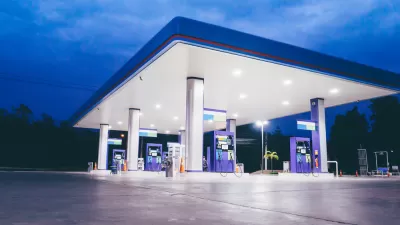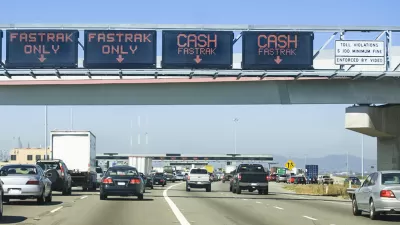Transportation ballot measures are popular this November: over 70 populate ballots across the country. In California and elsewhere, they supplement declining federal and state funds for local infrastructure.

Local transportation tax increases are generally quite popular (as tax increases go), and not just among Democrats. This November, Steve Scauzillo writes, "Nearly one-third of California's 58 counties will ask voters to approve transportation taxes, part of a record-setting number of measures appearing on ballots across the nation."
Local transit tax measures have long been on the rise. According to Jason Jordan at the Center for Transportation Excellence, if every such tax increase in the United States passes this year, they will raise $175 billion for transportation infrastructure.
On the local level, that's impressive, and necessary. Federal and state funding, which localities have come to rely on, is getting harder and harder to obtain. "In California during the last fiscal year, local funding equaled $14 billion, twice the amount of federal and state funds. The state has a $57 billion, 10-year shortfall in maintaining freeways and state highways." Part of the problem lies with the federal gas tax, which hasn't been raised for 22 years, allowing the Highway Trust Fund to deplete.
Additionally, getting federal grants in the first place often involves fronting some part of the money. "Several smaller counties, such as Placer and Humboldt, need to bank transportation dollars from local residents in order to pry even the smallest federal grant from Washington to widen a freeway or fix the potholes."
But voters appear willing to pay higher taxes to fund specific local projects. Businesses and residents can align behind the economic benefits of good local infrastructure. And, the article notes, nobody can take it away.
FULL STORY: Why everyone wants to join the transportation tax bandwagon across California, US

Planetizen Federal Action Tracker
A weekly monitor of how Trump’s orders and actions are impacting planners and planning in America.

Maui's Vacation Rental Debate Turns Ugly
Verbal attacks, misinformation campaigns and fistfights plague a high-stakes debate to convert thousands of vacation rentals into long-term housing.

Restaurant Patios Were a Pandemic Win — Why Were They so Hard to Keep?
Social distancing requirements and changes in travel patterns prompted cities to pilot new uses for street and sidewalk space. Then it got complicated.

In California Battle of Housing vs. Environment, Housing Just Won
A new state law significantly limits the power of CEQA, an environmental review law that served as a powerful tool for blocking new development.

Boulder Eliminates Parking Minimums Citywide
Officials estimate the cost of building a single underground parking space at up to $100,000.

Orange County, Florida Adopts Largest US “Sprawl Repair” Code
The ‘Orange Code’ seeks to rectify decades of sprawl-inducing, car-oriented development.
Urban Design for Planners 1: Software Tools
This six-course series explores essential urban design concepts using open source software and equips planners with the tools they need to participate fully in the urban design process.
Planning for Universal Design
Learn the tools for implementing Universal Design in planning regulations.
Heyer Gruel & Associates PA
JM Goldson LLC
Custer County Colorado
City of Camden Redevelopment Agency
City of Astoria
Transportation Research & Education Center (TREC) at Portland State University
Jefferson Parish Government
Camden Redevelopment Agency
City of Claremont





























